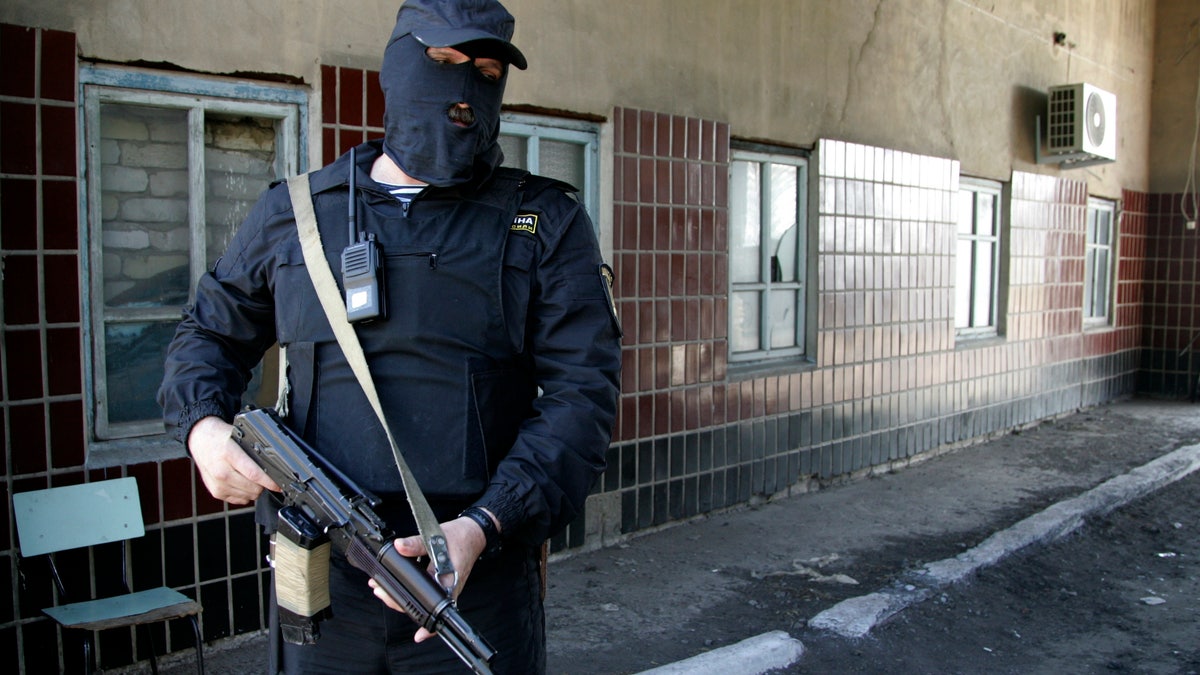
May 16, 2014 - An armed man of the Donbass Battalion, a non-affiliated militia group that has stated its intent to fight in support of Ukrainian unity, is on guard at a base near Donetsk, eastern Ukraine. The group says it has reclaimed Velyka Novosilka from pro-Russian separatists with the self-styled Donetsk Peoples Republic, an anti-government movement that has over the past few weeks been seizing government offices and declared its intent to merge the Donetsk region with Russia. (AP)
Human rights violations in eastern Ukraine have increased, and threaten a fair presidential election later this month, United Nations monitors said in a new report.
The report suggests police and local authorities in Eastern Ukraine were involved in illegal activity and participated in the violent seizure of towns, Reuters reported.
The U.N. monitoring mission’s report —released Friday—is based on information gathered in the region between April 2 and May 6. The Russian government has criticized the report, claiming it’s politically motivated.
Ukraine and many Western countries are hoping a fair and democratic presidential election May 25 will stabilize the volatile situation in the eastern part of the country. Insurgents have taken over government buildings, fought the Ukrainian military, and some have declared independence as the nation's crisis spilled over from a political upset into a military confrontation.
But several candidates reported intimidation and attacks and monitors said they had concerns about security.
"Those with influence on the armed groups responsible for much of the violence in eastern Ukraine (must) do their utmost to rein in these men who seem bent on tearing the country apart," U.N. human rights chief Navi Pillay said in a statement accompanying the report.
A senior State Department official said Thursday that if Russia plays a role in disrupting the election, the U.S. and European Union will move to impose additional economic sanctions against Moscow.
The U.N. report also cited a "wave of abductions and unlawful detentions" of activists, politicians, members of the military, and journalists.
Russia's Foreign Ministry said the report lacked objectivity, and charged the U.N. monitors were following "political orders" to whitewash pro-Western leadership, while ignoring "the crudest violations of human rights by the self-proclaimed Kiev authorities".
The monitors said they had credible reports of citizens being detained by the army against their will and were trying to authenticate reports of abuses by Ukrainian government forces.
Gianni Magazzeni, head of the U.N. human rights office's Americas, Europe and Central Asia branch, said there was no evidence to support concern for Russian-speaking people in Ukraine, and the U.N. report aimed to show where the major human rights issues were, which was chiefly in areas under the power of armed groups in the country’s east.
U.N. Assistant Secretary-General Ivan Simonovic said Russia had presented a "White Book" detailing its concerns about human rights. Simonovic said the U.N. was focusing equally on all allegations, and reported on them if they were considered serious.
U.N. monitors expressed specific concern about the treatment of sexual, religious and ethnic minorities, AIDS patients, journalists, and citizens who had not applied for Russian citizenship, who faced harassment and intimidation in Crimea.
A statement published Monday by the Organization for Security and Cooperation in Europe, concurred with the U.N. findings, saying its experts found "a significant number of serious human rights violations" during a visit to Ukraine in March.
In Berlin, German Chancellor Angela Merkel's spokesman Steffen Seibert said the OSCE report did not support Russia's contention that the rights of Ukraine's Russian minority were being violated.
"There is atmosphere of intimidation and discrimination, many people in Ukraine are suffering potentially life-threatening legal problems if they don't take up Russian citizenship," Seibert told a news conference.
Friday’s report was the second written by the U.N. monitoring mission. An April 15 report found ethnic Russians in eastern Ukraine had falsely claimed to be under assault to justify Russian intervention.
The Associated Press contributed to this report.
